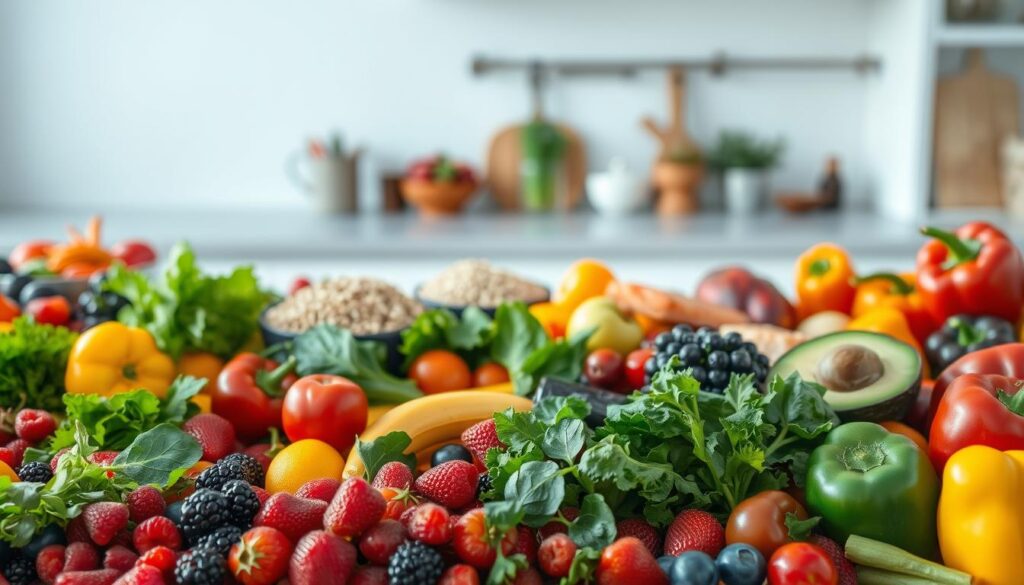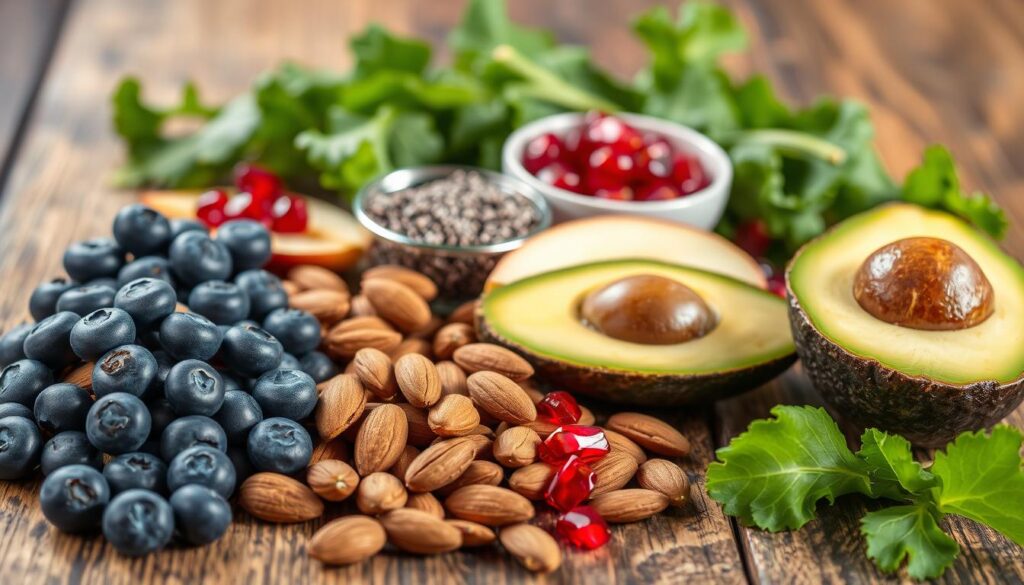Did you know simple diet changes can cut heart disease risk by up to 80%? Heart-healthy food swaps are key to better heart health without losing flavor1. By choosing the right foods, you can keep your heart safe and still enjoy tasty meals2.
Heart-healthy food swaps aren’t about cutting out food. It’s about making better choices. Cutting down on sugar, picking lower-fat options, and being mindful of what you eat can greatly improve heart health1. For example, switching from sugary cereals to plain ones can cut down sugar intake by 83 cubes1.
Making small changes in what you eat can make a big difference in your health. Try using semi-skimmed milk instead of whole milk, pick reduced-fat cheese, and use lower-fat spreads instead of butter. These simple swaps can help keep your heart healthy1.
Key Takeaways
- Simple food swaps can significantly reduce heart disease risk
- Dietary changes don’t require total food elimination
- Nutrition plays a crucial role in cardiovascular wellness
- Small modifications can lead to substantial health improvements
- Heart-healthy eating can be delicious and satisfying
Understanding Heart-Healthy Nutrition Basics
Nutrition is key to keeping your heart healthy. A heart-healthy diet is all about knowing how different foods affect your body. It’s about making choices that help you stay well.
The Role of Saturated and Trans Fats
Saturated and trans fats can harm your heart. Eating too much of these fats can raise your cholesterol levels3. This can lead to plaque in your arteries, raising the risk of heart attack or stroke3.
- Avoid processed foods with trans fats
- Limit saturated fat intake
- Choose healthier fat alternatives
Daily Recommended Guidelines
The American Heart Association has clear guidelines for a heart-healthy diet. They suggest:
- Eating 8 ounces of seafood each week3
- Keeping saturated fat under 6% of daily calories
- Choosing plant-based proteins4
Foods to Limit vs Foods to Embrace
Choosing the right foods is vital for heart health. The Mediterranean diet is a top choice for heart health. It focuses on plant-based foods and healthy fats3.
| Foods to Limit | Foods to Embrace |
|---|---|
| Processed meats | Fish rich in omega-34 |
| High-sodium items | Legumes and beans |
| Sugar-laden products | Fresh fruits and vegetables |
By following nutritional guidelines and making smart choices, you can create a heart-healthy diet. This diet supports your heart health for the long term.
Smart Dairy Alternatives for Cardiovascular Health
Protecting your heart starts with smart dairy choices. Full-fat dairy products can harm your heart because of their high saturated fat5. Switching to low-fat dairy can lower risks and keep nutrients6.
Looking for heart-healthy dairy swaps? Here are some calcium-rich options:
- Fat-free or low-fat milk6
- Greek yogurt with higher protein5
- Plant-based milk options
- Nutritional yeast as a cheese substitute
Choose dairy that’s nutritious but doesn’t harm your heart. Fat-free and low-fat dairy keeps calcium levels up while cutting saturated fats6.
Smart choices today protect your cardiovascular system tomorrow.
Here’s how to make heart-healthy dairy swaps:
- Read nutrition labels carefully
- Choose reduced-fat cheese options
- Try plant-based milk alternatives
- Use portion control with dairy
Small changes in dairy choices can greatly benefit your heart health7.
Protein Substitutions for Heart Health
Choosing the right proteins is key for heart health. Your protein choices can greatly affect your heart. It’s important to pick heart-friendly options for a healthy diet8.
When picking proteins, think about lean options and their nutritional value. Each protein source has its own heart health benefits.
Lean Meat Options
Go for lean meats to cut down on saturated fat. A 4-ounce lean beef has about 3.5 grams of saturated fat. But, remember to control your portions8. Here are some good protein choices:
- Skinless chicken breast
- Turkey
- Lean cuts of beef with visible fat trimmed
- Pork tenderloin
Lean turkey sausage is a great protein source with only 1.5 grams of saturated fat. This is much less than pork sausage9.
Plant-Based Protein Alternatives
Plant-based proteins are great for heart health. Legumes, tofu, and tempeh are packed with nutrients. They have less saturated fat and more fiber.
- Black beans
- Lentils
- Chickpeas
- Tempeh
- Edamame
Fish and Seafood Choices
Seafood is a heart health superstar, thanks to omega-3 fatty acids. Baking or grilling fish saves about 70 calories and cuts saturated fat by 50%9.
“Fish is not just food, it’s medicine for your heart” – Nutrition Experts
Here are some fish options:
- Salmon
- Sardines
- Mackerel
- Trout
Mindful protein choices can greatly boost your heart health. Focus on lean and nutritious proteins for a heart-healthy diet.
Transforming Your Breakfast Choices
Starting your day with a heart-healthy breakfast can greatly improve your heart health. Eating breakfast regularly may lower your total cholesterol levels10. It’s important to choose foods that are full of nutrients but low in sugar.
Whole grains are key for a heart-healthy breakfast. Here are some great options:
- Overnight oats with berries and ground flaxseed11
- Whole grain toast with avocado11
- Greek yogurt parfait with chia seeds11
Protein is vital for feeling full and supporting heart health. Good breakfast protein sources include:
| Protein Source | Protein Content | Additional Benefits |
|---|---|---|
| Cottage cheese | 14g per 1/2 cup | Low in fat, high in calcium |
| Eggs | 6g per egg | Rich in healthy fats |
| Almond butter | 6.7g per 2 tbsp | Contains heart-healthy fiber |
When making a heart-healthy breakfast, choose low-sugar options for lasting energy. Swap sugary instant oatmeal for plain oats with fresh fruits like papayas or berries11. This helps keep your blood sugar stable and lowers the risk of type 2 diabetes10.
By making smart breakfast choices, you can boost your heart health. Enjoy delicious, nutrient-rich meals that keep you full all morning10.
Better Bread and Grain Selections
Choosing the right grains is key for heart health12. Whole grains are packed with nutrients that boost heart health13. Switching to heart-healthy carbs can greatly improve your health and lower heart disease risks.
Whole Grain Benefits
Whole grains are full of nutrients that help the heart12. Wholegrain bread has more fiber, vitamins, minerals, and antioxidants than refined bread13. These foods help:
- Lower cholesterol levels
- Reduce inflammation
- Support healthy digestion
- Stabilize blood sugar
Reading Product Labels
When picking whole grain products, check the labels carefully. Look for these signs:
- 100% whole wheat as the first ingredient
- Minimal added sugars
- No artificial preservatives
- High fiber content
13Choose whole grain, minimally processed bread for better heart health12.
Smart Baking Substitutions
Make your baking healthier with whole grain swaps:
- Replace white flour with whole wheat flour
- Add ground flaxseed for extra nutrition
- Use oat flour for a nutrient boost
- Experiment with quinoa or buckwheat flour
These easy changes can make your baked goods much healthier.
10 Simple Food Swaps to Keep Your Heart Healthy Every Day

Changing your diet doesn’t need big steps. Simple swaps can boost heart health with little effort14. By making smart food choices, you can keep your heart healthy and enjoy tasty meals.
- Replace Hamburgers with Veggie Burgers: Veggie burgers are full of fiber and cut out bad fats14. They’re a tasty way to support your heart.
- Swap Iceberg Lettuce for Spinach: Spinach packs more nutrients than iceberg lettuce15. This easy switch boosts your nutrition.
- Choose Olive Oil over Butter: Olive oil is good for your heart with its healthy fats and antioxidants14.
- Replace Sour Cream with Greek Yogurt: Greek yogurt is high in protein and low in bad fats.
- Opt for Salmon Instead of Red Meat: Salmon is full of omega-3s, which lower heart disease risk15.
Good heart health comes from eating whole, nutrient-rich foods. Making one healthy swap a day can make a big difference15.
Small changes create lasting health impacts.
Heart health is a journey. Every mindful food choice moves you closer to better heart health.
Healthy Cooking Oil Alternatives
Choosing the right cooking oils is key to heart health. Heart-healthy oils add good fats to your diet. These fats are vital for your overall health16.
Swapping cooking oils can greatly improve your diet. Olive oil is a top pick, full of fats that lower cholesterol17. When picking oils, think about these important points:
- Smoke point for different cooking methods
- Nutritional profile
- Flavor compatibility with dishes
Here are some great heart-healthy oil options:
- Olive oil: Great for low to medium-heat cooking16
- Avocado oil: Has a high smoke point of 520°F, ideal for high-heat cooking18
- Canola oil: A versatile and heart-friendly vegetable oil18
Remember, each oil has its own special traits. Refined oils can handle high heat better. But extra virgin olive oil is best for dressings and low-heat cooking18.
Pro tip: Always store oils in cool, dark places to preserve their nutritional integrity and prevent rancidity.
By using these heart-healthy oils, you can boost your heart health. Plus, you’ll enjoy tasty meals17.
Smart Snacking for Heart Health
Snacking is important for a heart-healthy diet. Picking the right snacks helps control hunger and gives important nutrients. It also helps keep your heart healthy. It’s all about eating the right amount.
Portion Control Strategies
Starting with mindful eating and smart snack prep is key. Carefully measured servings stop you from eating too much. Here are some tips:
- Use small plates or containers to limit serving sizes
- Pre-portion snacks into individual servings
- Choose nutrient-dense options with fewer calories
Nutrient-Dense Snack Options

Picking the right snacks can really help your heart. Here are some good choices:
| Snack | Calories | Protein |
|---|---|---|
| Edamame Hummus | 167 | 6g |
| Mixed Nuts | 221 | 5g |
| Greek Yogurt with Honey | 197 | 13g |
Smart snacking is about quality, not just quantity.
Timing Your Snacks
Snacking at the right time keeps your energy up and supports heart health19. Here’s what to do:
- Eat small snacks between meals to prevent overeating
- Choose protein-rich options to promote satiety
- Avoid late-night snacking
By following these tips, you can enjoy tasty, healthy snacks that are good for your heart20.
Maintaining Long-Term Heart-Healthy Habits
Changing your diet for the long term is key to keeping your heart healthy. By making small, steady changes, you can lower your heart disease risk. These changes help turn short-term diets into lasting habits21.
Understanding how much to eat and what’s good for you is important. Eating whole grains can cut your heart disease risk by 10-20%21. Adding leafy greens to your diet is also crucial for your heart health21.
Planning your meals is vital for keeping up heart-healthy habits. Eating foods like avocados regularly can help improve your diet for good21. Using a variety of healthy ingredients and eating mindfully can change how you view food22.
Working towards better heart health is about finding a balance, not just cutting out foods. Making small, consistent choices like eating less saturated fat and whole grains helps a lot23. By adopting these changes, you can take charge of your heart health with confidence and enthusiasm.
FAQ
Why are food swaps important for heart health?
How much fat should I consume daily for heart health?
Are all dairy products bad for heart health?
What are the best protein sources for heart health?
How can I make my breakfast more heart-healthy?
What’s the difference between whole grains and refined grains?
Which cooking oils are best for heart health?
How can I make snacking heart-healthy?
Can I still enjoy flavorful food while maintaining a heart-healthy diet?
How quickly can I see improvements in my heart health through diet?
Source Links
- Top 10 healthy food swaps – https://www.bbcgoodfood.com/health/healthy-food-guides/top-10-healthy-food-swaps
- Healthier food swaps – Food facts – Healthier Families – https://www.nhs.uk/healthier-families/food-facts/healthier-food-swaps/
- 40+ Heart-Healthy Foods You Should Be Eating – https://health.clevelandclinic.org/heart-healthy-foods
- Picking Healthy Proteins – https://www.heart.org/en/healthy-living/healthy-eating/eat-smart/nutrition-basics/picking-healthy-proteins
- 15 Easy Food Swaps That Are Healthier For Your Heart – https://www.cardiaclauren.co.uk/blogs/diet/15-easy-food-swaps/
- Heart-Healthy Foods: Shopping List – MyHealthfinder – https://odphp.health.gov/myhealthfinder/health-conditions/heart-health/heart-healthy-foods-shopping-list
- Simple, heart-smart substitutions: MedlinePlus Medical Encyclopedia – https://medlineplus.gov/ency/patientinstructions/000746.htm
- 10 Heart-Healthy Food Swaps: Eliminate Unhealthy Ingredients – https://www.healthline.com/health/foods-for-the-heart
- 10 Food Swaps for Heart-Wise Dining – https://www.webmd.com/food-recipes/ss/slideshow-food-swaps
- 15 Heart-Healthy Breakfast Recipes to Start Your Day | Signos – https://www.signos.com/blog/heart-healthy-breakfast
- 10 Breakfast Foods to Boost Your Energy – https://www.healthline.com/health/nutrition/foods-to-jump-start-your-day
- 10 simple healthy food swaps – https://www.weightwatchers.com/uk/blog/food/10-simple-healthy-food-swaps?srsltid=AfmBOorjef2wEnLr6XP7sT-T7Cs0NA9h6wr1wUzH0hQoH2CfDe1VYDbm
- 7 simple swaps for a healthier heart – https://www.today.com/health/diet-fitness/heart-healthy-lifestyle-swaps-rcna51867
- 10 Smart Food Swaps for a Healthy Heart – https://www.huffpost.com/entry/diet-and-nutrition_b_4732213
- 12 Smart Food Swaps For A Healthy Heart – Good Food Made Simple – https://www.goodfoodmadesimple.com/blog/12-smart-food-swaps-for-a-healthy-heart-2/
- 10 simple healthy food swaps – https://www.weightwatchers.com/uk/blog/food/10-simple-healthy-food-swaps?srsltid=AfmBOoqTDI_0HLZHvvAXVWEYZe25F3eBdxz4sWqBaF9Hq6JjV_puuV5I
- 21 Foods That Can Save Your Heart – https://www.webmd.com/heart-disease/ss/slideshow-foods-to-save-your-heart
- You Can Use Applesauce Instead of Vegetable Oil the Next Time You’re Out – https://www.goodhousekeeping.com/food-recipes/cooking/g32213177/vegetable-oil-substitutes/
- Simple Food Swaps – https://www.azheartfoundation.org/post/simple-food-swaps-1
- 23 Heart-Healthy Snacks to Keep You Satisfied – https://www.tasteofhome.com/collection/heart-healthy-snacks/?srsltid=AfmBOorwykyOmcqJx5tdd4EsbtVKGAShkZa9a8L5qzs4DWJcb7Tu8eUw
- 17 Incredibly Heart-Healthy Foods – https://www.healthline.com/nutrition/heart-healthy-foods
- Healthy eating – https://www.bhf.org.uk/informationsupport/support/healthy-living/healthy-eating
- 8 steps to a heart-healthy diet – https://www.mayoclinic.org/diseases-conditions/heart-disease/in-depth/heart-healthy-diet/art-20047702




